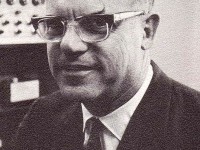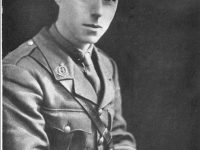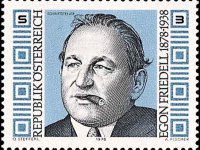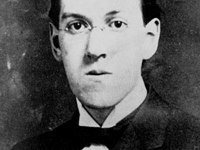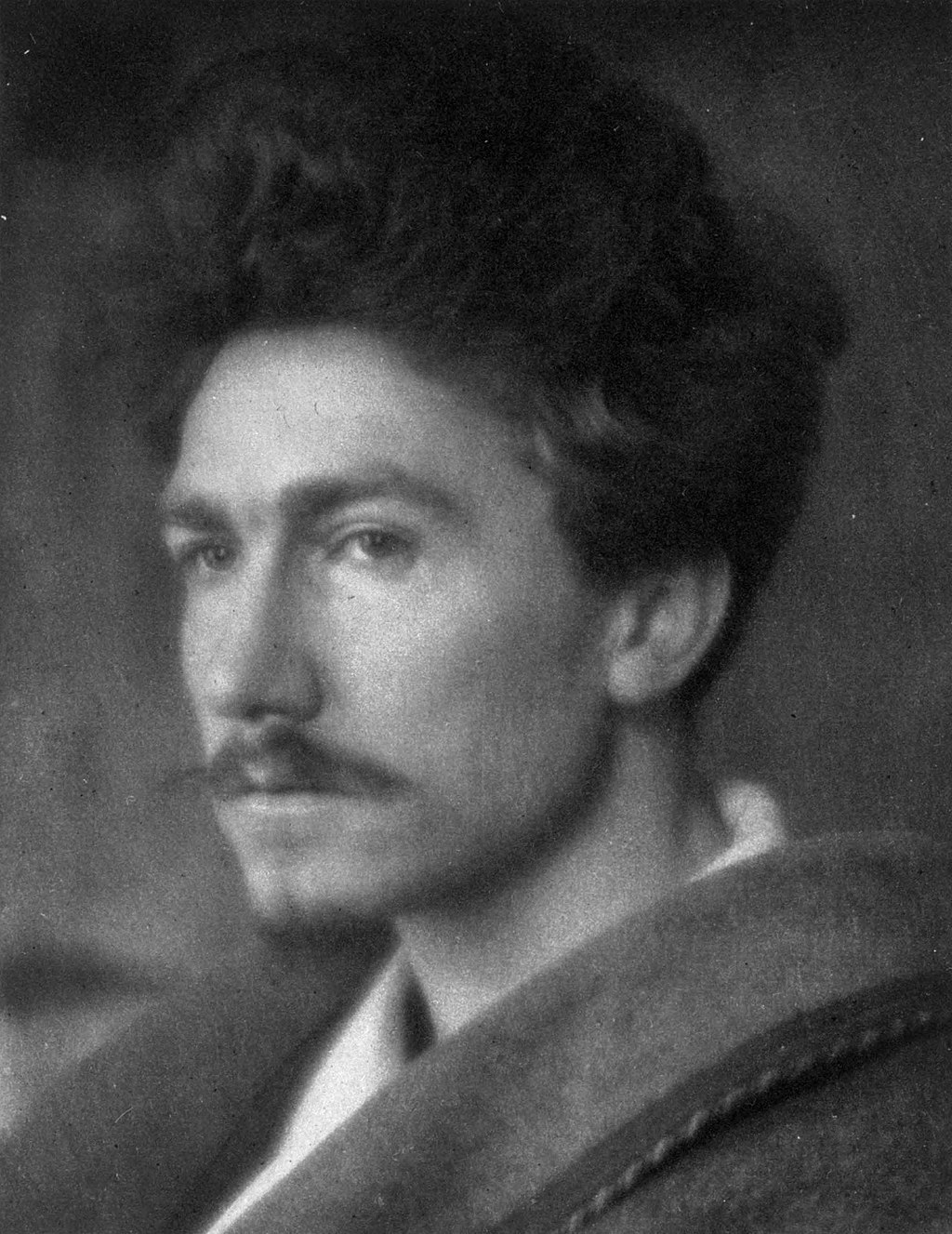
Ezra Pound (1885-1972)
On October 30, 1885, expatriate American poet and critic Ezra Pound was born. He is regarded as one of the outstanding representatives of literary modernism. His main work is The Cantos. Before 1914 he propagated Imagism and Vorticism. During his stay in Italy from 1924 to 1945 he admired and supported Italian fascism.
Ezra Pound – Early Years
Ezra Pound was the only child of his parents Homer Loomis Pound and Isabel née Weston in Hailey, Idaho Territory, USA. Pound’s education began in a series of dame schools, some of them run by Quakers. Between 1897 and 1900 Pound attended Cheltenham Military Academy, sometimes as a boarder, where he specialized in Latin. He studied comparative literature and Romance studies at the University of Pennsylvania and Hamilton College in New York State from 1900 to 1905. During this time he became friends with William Carlos Williams and Hilda Doolittle (better known by their initials H. D.), and she became his first serious romance. He had been friends with Williams for a long time, even though both were very often contrary opinions – Pound stylized himself as a classically educated writer, Williams gave in his autobiography the uneducated American who had little idea of European literature. In 1908 Pound moved to Europe, where he first lived in Venice. During his studies and also further in Europe he dealt intensively with Provençal literature and created a number of translations and poems.
The London Years
From 1909 to 1920 he lived with interruptions in London, where he met the most important English-speaking writers of his time, including James Joyce [1], Ford Madox Ford and Wyndham Lewis. At a literary salon in January 1909, Pound met the novelist Olivia Shakespear and her daughter Dorothy, who became his wife in 1914. Through Olivia Shakespear he was introduced to her former lover W. B. Yeats,[2] in Pound’s view the greatest living poet. Despite a difference of 20 years in age, the two men should become close friends. Pound also saw Williams in France again, who was on a trip to Europe with his wife. During his first time in London, he belonged to the Imagists, a literary movement that experimented with scarce lyrical language and was influenced by Far Eastern literature, including Japanese haikus. Pound published works in this group’s mouthpiece, The Egoist magazine. The encounter with the sculptor Henri Gaudier-Brzeska led to the movement of Italian Futurist-oriented Vortizism. BLAST, the magazine of the movement published by Wyndham Lewis, experienced only two editions.
Who brought this to pass?
Who has brought the flaming imperial anger?
Who has brought the army with drums and with kettle-drums?
Barbarous kings.
A gracious spring, turned to blood-ravenous autumn,
A turmoil of wars-men, spread over the middle kingdom,
Three hundred and sixty thousand,
And sorrow, sorrow like rain.
– Ezra Pound, ‘Lament of the Frontier Guard’ (From Cathay, 1915)
From London to Paris
During the First World War Pound worked in Ireland as the private secretary of his role model William Butler Yeats. During this time, the widow of East Asia connoisseur Ernest Fenollosa was looking for someone to publish her husband’s estate. She found him in Pound, who then dealt with East Asian poetry and published Fenollosa’s text for the Japanese Nō theatre. In 1915 he began his main work, the Cantos (“Songs“), on which he worked until his death. From 1920 to 1924 he lived in Paris. During this time he met the violinist Olga Rudge, with whom he and his wife lived in a triangular relationship until his death. In 1922 he edited T. S. Eliot’s poem The Waste Land,[3] which, along with his own cantos, is one of the most important lyrical works of English-language modernism. Ernest Hemingway asked Pound to blue-ink his short stories. Although Hemingway was 14 years younger, the two forged a lifelong relationship of mutual respect and friendship.[4] Pound was 36 when he met the 26-year-old American violinist Olga Rudge in Paris in late 1922, beginning a love affair that lasted 50 years.
An Advocate of Fascism
The Pounds were unhappy in Paris; Dorothy complained about the winters and Ezra’s health was poor. At one dinner, a guest randomly tried to stab him; to Pound this underlined that their time in France was over. In 1924 they turned their backs on Paris and settled in Rapallo, Italy. Pound began work on The Cantos in earnest after relocating to Italy. The poems concern good and evil, a descent into hell followed by redemption and paradise. Its hundreds of characters fall into three groupings: those who enjoy hell and stay there; those who experience a metamorphosis and want to leave; and a few who lead the rest to paradiso terrestre. Its composition was difficult and involved several false starts, and he abandoned most of his earlier drafts, beginning again in 1922. In Italy he soon became Mussolini’s advocate. Pound remained in Italy even after the outbreak of the Second World War and spread anti-American, racist and anti-Semitic propaganda via Radio Rome, journalistically and in his poems (Cantos 72-73). Pound holds the Jews responsible for the rule of usury, Latin usura. “The Jews”, international and American capitalism, had, in his opinion, also caused the Second World War. In 1938 he was elected to the American Academy of Arts and Letters. Pound was arrested in 1945 after the invasion by American troops. It is reported that he surrendered himself. On 8 May, the day Germany surrendered, Pound told an American reporter, Ed Johnston, that Hitler was “a Jeanne d’Arc, a saint“, and that Mussolini was an “imperfect character who lost his head“. On 24 May he was transferred to the United States Army Disciplinary Training Center north of Pisa, where he was placed in one of the camp’s “death cells”, a series of six-by-six-foot outdoor steel cages lit up at night by floodlights; engineers reinforced his cage with heavier steel for fear the fascists would try to break him out.
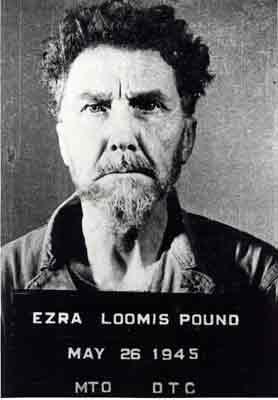
Ezra Pound – Taken at the Army Disciplinary Training Center
Accused of Treason
It was in the period at the end of the war while he was interned in American-occupied Italy that the most famous part of his cantos, the Pisan Cantos, was created for which he received the prestigious Bollingen Prize in 1949. On July 26, 1943, he was accused of treason in the USA along with Frederick W. Kaltenbach, Robert Best, Jane Anderson, Douglas Chandler, Edward Leo Delaney, Constance Drexel, and Max Otto Koischwitz. He escaped a post-war conviction and possible death penalty only because he was declared mentally ill by an expert. He spent the next twelve years at St. Elizabeth’s Hospital, a state sanatorium in Washington, D.C., where he was sentenced to a mental illness. Although Pound repudiated his antisemitism in public, he maintained his views in private. He refused to talk to psychiatrists with Jewish-sounding names, dismissed people he disliked as “Jews”, and urged visitors to read the Protocols of the Elders of Zion (1903), a forgery claiming to represent a Jewish plan for world domination.
Back again in Italy
In 1958 he was released at the instigation of friends, including Ernest Hemingway. Shortly after Hemingway won the Nobel Prize in Literature in 1954, he told Time magazine that “this would be a good year to release poets“. Pound arrived in Naples in July 1958, where he was photographed giving a fascist salute to the waiting press. He returned to his daughter Mary de Rachewiltz and settled on the Brunnenburg above Meran in the Burggrafenamt (South Tyrol) and in Venice, which belonged to his daughter and her husband Boris de Rachewiltz. He lived largely withdrawn until his death and finally refused to speak at all. In 1967 Pound made his last trip to Paris to visit the sculptor Arno Breker. Pound sat in Breker’s studio in the Rue de Navarin as a model for a portrait. In 1967 Pier Paolo Pasolini played a major role in the documentary Un’ ora con Ezra Pound produced by RAI. In it the communist director and poet expressed his admiration for Pound and read his poems in Italian translation. On his 87th birthday, 30 October 1972, he was too weak to leave his bedroom. The next night he was admitted to the Civil Hospital of Venice, where he died in his sleep of septic shock caused by complications from an intestinal blockage on 1 November.
If a man have not order within him
He can not spread order about him;
And if a man have not order within him
His family will not act with due order;
And if the prince have not order within him
He can not put order in his dominions.
– Ezra Pount, Canto XIII
The Cantos
The cantos are regarded in the USA as one of the most important poems of the 20th century. The model for his main work was initially Dante’s Divine Comedy, in later decades he integrated numerous other forms and an encyclopaedic wealth of motifs, often of an occult or mystical nature. Central are the Pisan chants, which he wrote during and after his internment in Italy. The first poems were published in 1917 in the magazine Poetry; over the years the Cantos for Pound became more and more his main work. The first complete edition of 1970 contains a total of 117 songs. The most striking feature of the text, to a casual browser, is the inclusion of Chinese characters as well as quotations in European languages other than English. Recourse to scholarly commentaries is almost inevitable for a close reader. The range of allusion to historical events is very broad, and abrupt changes occur with little transition. There is also wide geographical reference. Pound added to his earlier interests in the classical Mediterranean culture and East Asia selective topics from medieval and early modern Italy and Provence, the beginnings of the United States, England of the 17th century, and details from Africa he had obtained from Leo Frobenius. Many references in the text lack explanation. Pound initially believed that he possessed poetic and rhetorical techniques which would themselves generate significance, but as time passed he became more concerned with the messages he wished to convey.
Langdon Hammer, 9. Ezra Pound, [11]
References and Further Reading:
- [1] James Joyce and Literary Modernism, SciHi Blog
- [2] William Butler Yeats and Modern English Literature, SciHi Blog
- [3] We Are the Hollow Men – T. S. Eliot, SciHi Blog
- [4] The Last Safari – The Phenomenon Ernest Hemingway, SciHi Blog
- [5] The Cantos Project
- [6] The Ezra Pound Society
- [7] Works by or about Ezra Pound at Internet Archive
- [8] Ezra Pound recordings, University of Pennsylvania.
- [9] Texts authored by Ezra Pound at Wikisource
- [10] Ezra Pound at Wikidata
- [11] Langdon Hammer, 9. Ezra Pound, Modern Poetry (ENGL 310) with Langdon Hammer, 2012, YaleCourses @ youtube
- [12] Desai, Meghnad (2006). The Route of All Evil: The Political Economy of Ezra Pound. London: Faber & Faber.
- [13] Eliot, T. S. (1917). Ezra Pound: His Metric and his Poetry. New York: Alfred A. Knopf.
- [14] Timeline for Ezra Pound via Wikidata

